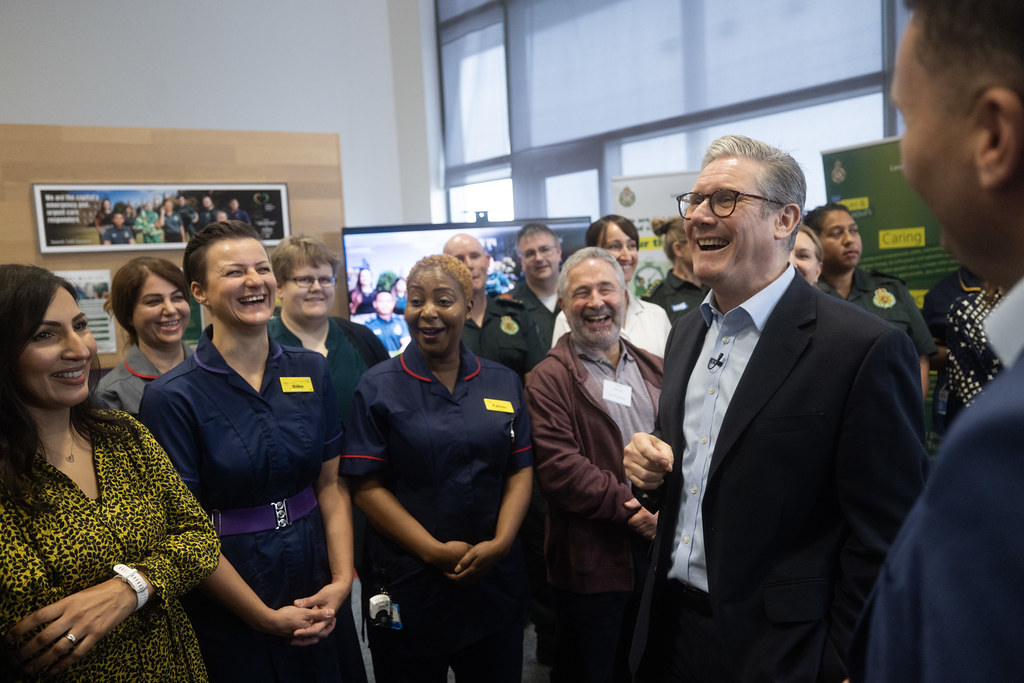The NHS 10-Year Plan: A bold vision but we need greater investment in our global health workforce
8 July 2025

Last week, the UK Government unveiled its long-awaited NHS 10-Year Plan, an ambitious roadmap to rescue and reimagine a struggling health system.
Central to the 10-year plan is a bold and welcome vision to build a bigger, more sustainable workforce.
The plan is rooted in long-overdue commitments to invest in domestic training and improve staff retention in the UK. However, Global Health Partnerships (formerly THET) also welcomes the recognition that the NHS is one of the most internationally connected healthcare systems and has a clear leadership role in advancing health globally.
The NHS is uniquely positioned to lead by example in demonstrating how ethical recruitment, investments in global health and equitable partnerships can contribute to stronger health systems and improve health security both in the UK and globally.
Recruitment and retention of all health workers means a stronger NHS
The plan outlines ambitions to train thousands more GPs, create 2,000 more nursing apprenticeships, expand the number of nursing consultants, create 1,000 speciality training posts, and expand medical school places, prioritising UK students.
Its ambition to reduce international recruitment to less than 10% by 2035 is framed as a move towards self-sufficiency, but a truly sustainable workforce strategy must recognise the global nature of healthcare and the need for fairness, reciprocity, and support beyond our own borders.
Strengthening the domestic workforce should not mean closing the door to international professionals. In an increasingly interconnected world, we must champion ethical, transparent recruitment and value the role and experiences of diaspora staff, working together toward a fairer, more connected, global health system.
A commitment to lead on health security
“The recent experience of COVID-19 demonstrated how interconnected global health is. If we want to protect health in the UK, we will need to support global health security.”
PP 127, Fit For the Future: The 10 year Health Plan for England
Supporting health systems around the world is not an act of charity— it is a vital investment in our own safety, economy and NHS resilience.
From pandemic preparedness to antimicrobial resistance (AMR), building a skilled, interconnected global health workforce is essential to our collective future.
Through successive governments, the UK has already shown leadership in tackling the growing antibiotic emergency that is already having devastating impacts globally.
The Commonwealth Partnerships for Antimicrobial Stewardship (CwPAMS), funded by the UK Department of Health and Social Care’s Fleming Fund, supports partnerships between NHS trusts and African health institutions that have demonstrated how local action on AMR can drive global learning and practice. To date, over 65,000 health workers have been trained, leading to improved prescribing practices, stronger infection control, and a deeper understanding of AMR among both partners and staff.
– Charlotte Makanga, Malawi-Wales Health Partnership Lead & Director of Pharmacy and Medicines Management, Betsi Cadwaladr University Health Board
The UK Government must continue to invest in a robust global workforce which protects the UK against future pandemics, strengthens our response to global health threats, and ensures we remain connected to the innovation, skills, and leadership of our international colleagues.
Global investment in health for long-term health systems strengthening
Over the past two decades, the UK, alongside other high-income countries, has benefited enormously from the migration of health professionals trained in low- and middle-income countries (LMICs).
Financially, these savings, often totalling millions per clinician, have come without proportionate reinvestment in the countries that trained them.
— Ben Simms, CEO, Global Health Partnerships
Ethical recruitment means more than good intentions, it means recognising this imbalance and taking steps to redress it.
As the UK invests in growing its domestic health workforce, it must also take responsibility for the global impact of its recruitment practices. This means sustained investment in health systems and Health Partnerships – such as the Global Health Workforce Programme – across LMICs to ensure mutual benefit, long-term resilience, and fairness.
Self-sufficiency AND global solidarity
The NHS of the future must be resilient, locally rooted but globally connected. Training more staff at home is as essential as supporting the health workforce globally.
The UK has a unique opportunity to lead not only by strengthening its domestic health system, but by rebalancing its global impact.
A strong NHS depends on strong health systems everywhere. Let’s lead not just with strategy, but with solidarity, by investing in a global health workforce that protects us all.
*PHOTO: Prime Minister Keir Starmer and Secretary of Health and Social Care, Wes Streeting launch the NHS 10 Year Plan Consultation at the London Ambulance Service Dockside Centre. Picture by Simon Dawson / No 10 Downing Street. CC BY 2.0


1 Comment
Leave a comment
Your email address will not be published.